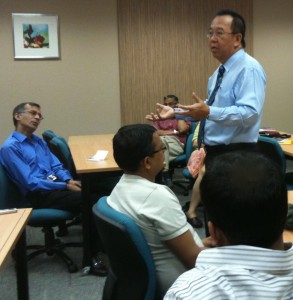by
BHAVAN JAIPRAGAS
March 19th, 2010
Newspaper veteran Leslie Fong said that economic pressures may force news media companies to pool their coverage of basic assignments instead of letting their different titles send separate reporters to cover the same event. At present, it is common for press conferences and other events to be attended by several journalists from Singapore Press Holdings, which publishes nine daily newspapers in four languages.
 A pool system would mean sending just one reporter per language medium to an event, saving manpower cost. The newspapers who are part of the pooling arrangement would all pick up the same story, but develop it in their own way if necessary.
A pool system would mean sending just one reporter per language medium to an event, saving manpower cost. The newspapers who are part of the pooling arrangement would all pick up the same story, but develop it in their own way if necessary.
Fong, who was editor of The Straits Times from 1987 to 2002, was speaking at an Asia Journalism Fellowship seminar about the Business of Journalism yesterday at NTU’s Wee Kim Wee School. Although currently the marketing chief of SPH, Fong was giving his personal views as a veteran newspaperman and stressed that he was not speaking for SPH.
Responding to a question about what newspapers around the world could do to make themselves more commercially viable, he said that they had little choice but to trim their manpower costs.
Fong noted that newspapers that do not have foreign bureaus already rely on pool reports for international news, receiving “a common fodder” in the form of wire agency copy. They then customise the stories according to the interests of their readers. “Each newspaper must identify for itself its own niche, use the basic raw materials and add its own expertise to make a story in its typical style,” he said.
Doing this for local coverage is not common here, but a standard practice in larger countries. Britain’s Press Association and the Press Trust of India, for example, help newspapers in those countries save on reporting costs. Mediacorp recently integrated the newsgathering functions of Today, Channel News Asia and its online operations, with reporters now pooled in an integrated “Newshub”.
At a recent conference on the future of news media, participants heard that experiments such as Newshub posed major challenges in change management, as they tended to be resisted by deeply entrenched ways of working. Newshub chief Chitra Rajaram, a speaker at the conference, acknowledged that the kinks in the pool system had yet to be ironed out.
As for the quality of stories, Fong noted that for straightforward stories such as run-of-the-mill crimes, there was not much scope for variety in treatment and little would be lost in having a pool system. Asked if a pool system would lead to stories being told from fewer perspectives and a deterioration of journalistic standards, he said the onus was on each newspaper’s editor to ensure that it adds value to the basic story it receives from the pool, instead of dumping the copy wholesale into its pages.
Apart from manpower, Fong said newspapers would also be looking into cutting printing costs in order to to remain competitive. At present, newspaper companies around the world have refrained from abandoning the print medium because they are unsure that their online advertising revenue can compensate the loss of circulation revenue. Fong said that it was just a matter of time before e-readers emerged which could effectively replace printed newspapers. Readers could then pay for content through subscriptions or micro-payments.
He mentioned that the SPH Group was closely monitoring the development of e-readers in the market, including those developed by Creative Technologies, Sony Ericsson and Hearst Corporation. It is also collaborating with a group in WAN-IFRA to explore how E-readership can be monetised and incorporated into the industry effectively.
On the health of newspapers in Singapore, he said that the English press was still doing well, while the Malay and Tamil papers, though small, remained viable. The Chinese papers were declining faster. He said that being part of a large and profitable media group was thus an advantage: SPH recognised its social obligation to Singapore’s multi-racial society and would continue to publish in the various languages.

Be the first to comment on "News veteran Leslie Fong says newspapers may have to pool reporters to cut costs"